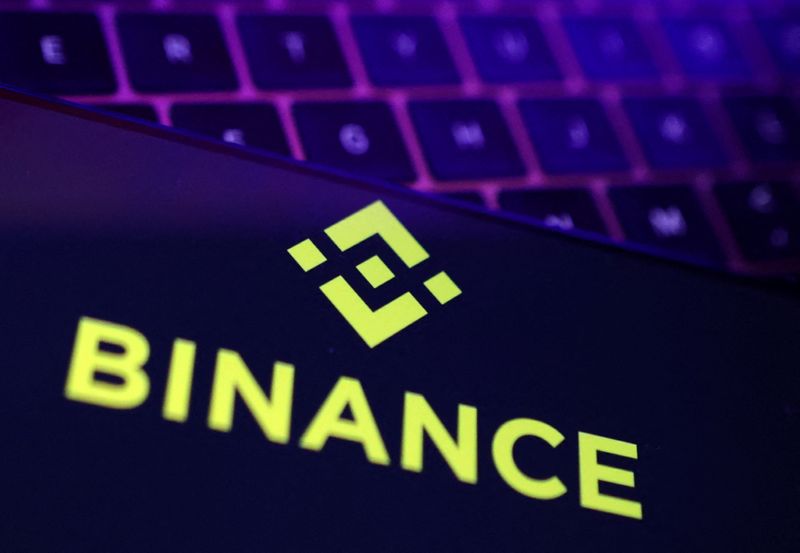By Tom Wilson and Hannah Lang
LONDON/WASHINGTON(Reuters) -The world's biggest cryptocurrency exchange Binance and its CEO Changpeng Zhao have been sued by the U.S. Securities and Exchange Commission (SEC), which alleged in a June 5 court filing that the firm operated a "web of deception" that included artificially inflating its trading volumes and commingling customer funds.
The U.S. Commodity Futures Trading Commission (CFTC) also sued Binance over regulatory violations in March. Binance did not immediately respond to a request for comment for this story.
Here are some key facts about Binance:
THE COMPANY
Binance was founded in Shanghai in 2017, but later moved to Tokyo and then Malta. While its holding company is based in the Cayman Islands, Binance says it does not have a headquarters and has declined to state the location of its main Binance.com exchange.
The exchange offers spot and derivatives trading and a host of services from non-fungible tokens (NFTs) to crypto loans and asset management.
It has 120 million users, according to its website. Zhao said in November tweet that Binance has more than 7,400 employees across the world. The company also boasts a formidable social media presence, with over 10 million Twitter followers.
FINANCES
Binance's global trading platform, Binance.com, is by far the world's biggest cryptocurrency exchange. Last year it processed crypto trades worth about $65 billion a day, Binance said, dominating the crypto trading landscape with more than half of the market, CryptoCompare data shows.
Yet its finances are opaque. As a privately held company, it does not disclose basic financial information such as revenue, profit and cash reserves. Binance has also not raised outside capital since 2018, industry data show, which means it has not had to share financial information with external investors since then.
A Reuters analysis of Binance's corporate filings last year found that the core of the business – the Binance.com exchange – remains mostly hidden from public view.
LEADERSHIP
Binance was founded by CEO Changpeng Zhao, a Canadian citizen born and raised age 12 in China, and Yi He, former host of a Chinese TV travel show. The pair were in a romantic relationship and have a son together who was born in the United States, Reuters reported in October.
Yi He is now one of Zhao's most powerful deputies, running the company's $7.5 billion venture capital arm as well as holding other key roles including marketing chief.
Zhao assigned top jobs to an inner circle of associates, many of whom had worked or studied in China, according to the Reuters report in October. The company has hired extensively from the traditional financial and regulatory worlds in recent years. In February, Noah Perlman, a veteran of Morgan Stanley (NYSE:MS), said he had become Binance's chief compliance officer.
In late May, Binance appointed Richard Teng to head its regional markets outside the United States. Teng is seen as the most likely candidate to succeed Zhao as CEO, according to media reports.
INVESTMENTS
Binance's venture capital arm has since 2018 invested in over 200 venture investments, the company says. PitchBook data shows that it has spend almost $2 billion across over 150 deals, including major data site CoinMarketCap.
Binance last year extended its reach beyond the crypto sector in 2022, investing $500 million in Tesla boss Elon Musk's takeover of Twitter.
The company is also prominent in the world of sport, sponsoring Italian soccer team Lazio and the Argentina national team. It also sponsored the 2021 African Cup of Nations tournament. In 2022, Binance signed a partnership to promote its NFTs with Portuguese soccer star Cristiano Ronaldo.
LEGAL WOES
The CFTC in March sued Binance, Zhao and the firm's former top compliance executive with "willful evasion" of U.S. law, alleging that from at least July 2019 to the present, Binance "offered and executed commodity derivatives transactions on behalf of U.S. persons" in violation of U.S. laws.
The commodities regulator also said Binance's compliance program has been "ineffective" and the firm, under the direction of Zhao, told employees and customers to circumvent compliance controls. Zhao called the CFTC's complaint "unexpected and disappointing."
The SEC on June 5 filed 13 charges against Binance and Zhao for failing to restrict U.S. customers from its platform, misleading investors about its market surveillance controls and for operating an unregistered securities exchange.
The agency also alleged that Binance and Zhao secretly control customers’ assets, allowing them to commingle and divert customer funds, and that Binance created separate U.S. entities “as part of an elaborate scheme to evade U.S. federal securities laws.”
In a statement, Binance said it intends to defend its platform "vigorously," and that any allegations that user assets on Binance's U.S. platform have ever been at risk "are simply wrong."

Binance is also under investigation by the Justice Department for suspected money laundering and sanctions violations, Reuters has reported, citing people familiar with the probe.
A top Binance executive told the Wall Street Journal in February that the company expected to pay penalties to resolve U.S. investigations.